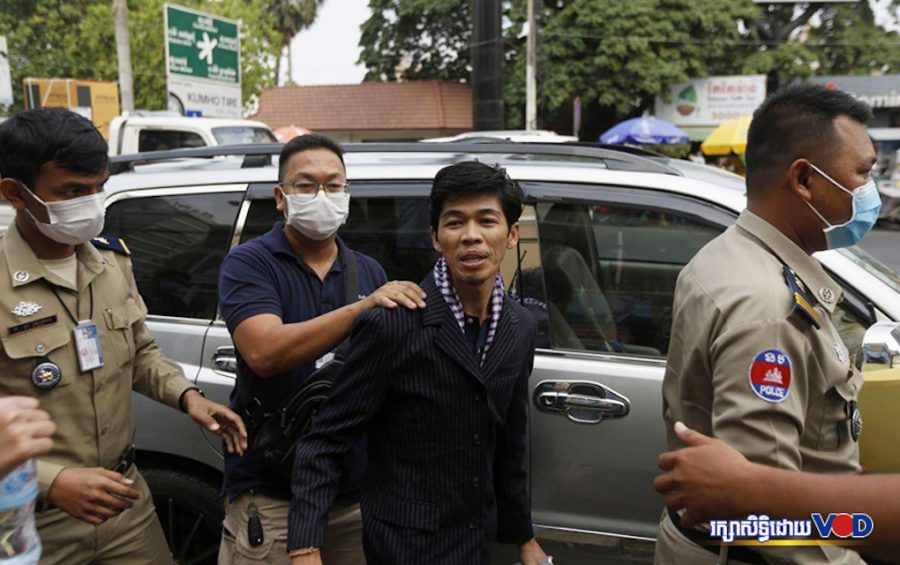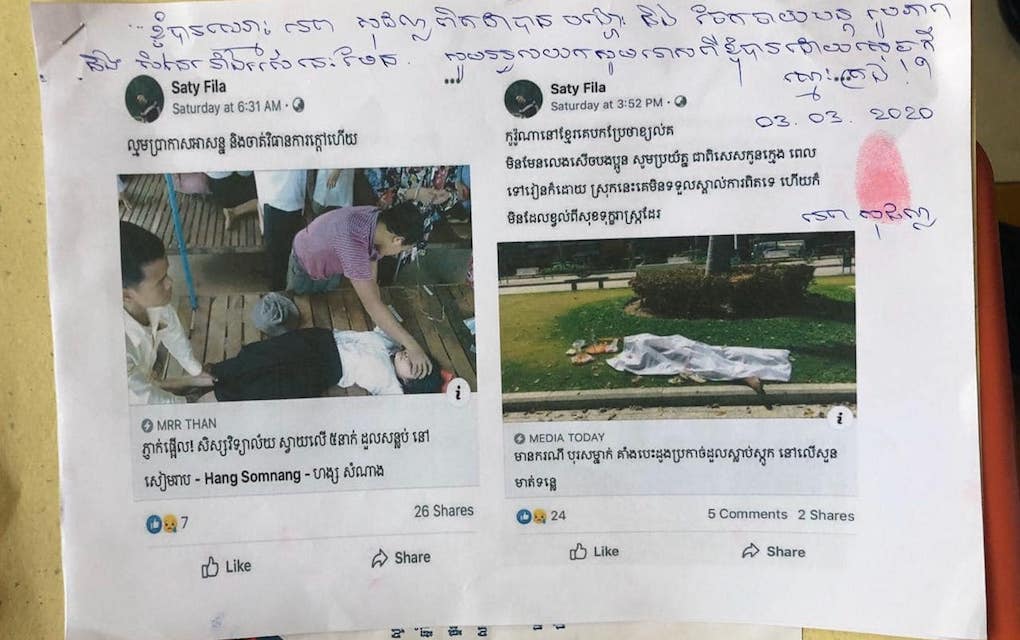More than 40 people have been arrested this year in relation to alleged chaos-causing incitement and spreading coronavirus-related “fake news,” a police spokesman said.
The growing number of arrests come as human rights groups and the U.N. rights commissioner have called on Cambodia to uphold civil and political rights, including press freedom and freedom of expression, regardless of government responses to the Covid-19 pandemic.
Since the outbreak began, 20 people have been held and sent to court for posting allegedly false information about the virus, while 22 others were “educated” and released, National Police spokesman Chhay Kim Khoeun told VOD on Wednesday.
Kim Khoeun said the police were acting within the law.
“Usually, whatever the judicial police do must go through the courts, even when they detain someone for questioning, and we need approval from the prosecutor,” he said. “After questioning, we have to report to the prosecutor for inspection and to decide whether [the detainee] should be sent forward or be released.”
“We follow all procedures and don’t just do whatever [we want],” he added.
Kim Khoeun said an additional 18 people were arrested for selling products like unapproved Covid-19 test kits or tonics that vendors claimed could cure the respiratory disease. Three among them were sent to court and provisionally detained, according to the spokesman.
Last week, human rights group Licadho said 26 Cambodians had been arrested and accused by authorities of spreading false information about Covid-19 or similar allegations since January, with about 10 detained at the time. Eight of those charged were affiliated with the outlawed main opposition CNRP, Licadho said.
Banteay Meanchey provincial authorities arrested another CNRP supporter, Nhem Van, on Wednesday, and the Phnom Penh Municipal Court charged him with incitement to commit a felony, Kim Khoeun said. The police spokesman did not provide further details on the alleged crime.
In September, more than 100 police officers went to Van’s home in Svay Rieng province — with some entering his house without a search warrant, according to his son — while other CNRP party members were gathered there, Radio Free Asia (RFA) reported at the time.
An unnamed activist who attended the gathering told RFA that police had wanted to arrest Van because he had spoken with the radio outlet about his intention to join CNRP co-founder Sam Rainsy on his planned return to Cambodia in November 2019.
A police chief told local media at the time that Van’s house had been searched because the CNRP supporters had “gathered without a permit,” according to RFA.
Dozens of former CNRP officials and party members were arrested last year in relation to voicing their support for Rainsy’s unrealized homecoming.
This year, several members of the banned opposition party have been arrested and detained among others who were accused of spreading false information related to Covid-19.
Phil Robertson, Human Rights Watch’s deputy Asia director, told VOD that the Cambodian government has become a poster child for exactly what not to do in response to the pandemic.
“People are being arrested and thrown into jail for daring to criticize on Facebook the government’s Covid-19 response. CNRP members who speak up are singled out for even worse treatment by the authorities,” Robertson said in an email.
Kata Orn, a spokesman for the government’s Cambodia Human Rights Committee, defended authorities’ actions against social media users, stating that the government was acting to ensure social stability, and promote, not erode human rights.
“This is a legal enforcement measure, and it does not violate human rights, but it is a kind of shared respect: respect for the nation’s benefit, respect for society, respect for each other,” he said.

Last week, TVFB editor-in-chief Sovann Rithy was arrested on incitement charges after sharing a Facebook post that accurately quoted remarks made by Prime Minister Hun Sen in a speech.
HRW’s Robertson said in a statement that Rithy’s detention marked “a new low for press freedom” in the country.
In late February, U.N. High Commissioner for Human Rights Michelle Bachelet called on the Cambodian government to respect citizens’ rights, including “freedom of the media, the impartial rule of law, and the right to freely participate in public affairs without fear of persecution.”
Last week, Bachelet told the U.N. Human Rights Council that countries around the world were enforcing restrictions in response to the public health emergency, but the crisis is not “a blank check to disregard human rights obligations.”
She noted concerns over restrictions on media freedom and freedom of expression, and said vague measures to “combat alleged ‘misinformation’ could be applied to any criticism,” according to a statement.
In some countries, she said, “ordinary people [have been] arrested for social media postings about the pandemic.”
“Criticism is not a crime,” she added.
Bachelet said she was also concerned by some countries’ adoption of unlimited emergency powers that were not subject to review.
Cambodian legislators are currently pushing forward a state of emergency law that would give the government broad powers to restrict citizens’ movements and communications, and punish those who break the law with up to 10 years in prison. The draft law has drawn criticism from civil society groups, which cited vague language and the potential for abuse. But officials have said the law is necessary to manage a pandemic or other national emergencies, and defended its drafting as neither “a human rights violation nor a power-gathering tool.”
After the National Assembly voted unanimously in favor of the draft law last week, the Senate is expected to approve it on Friday, Senate secretary-general Oum Sarith told VOD.
As of Thursday, Cambodia reported no new Covid-19 cases for the fourth consecutive day, while nearly 100 of 122 infected people have recovered, the Health Ministry said.
Earlier this week, the ministry and WHO warned that the country needed to prepare for a possible wider outbreak and community transmission.
Additional reporting by Nat Sopheap
(Translated and edited from the original articles on VOD Khmer)













